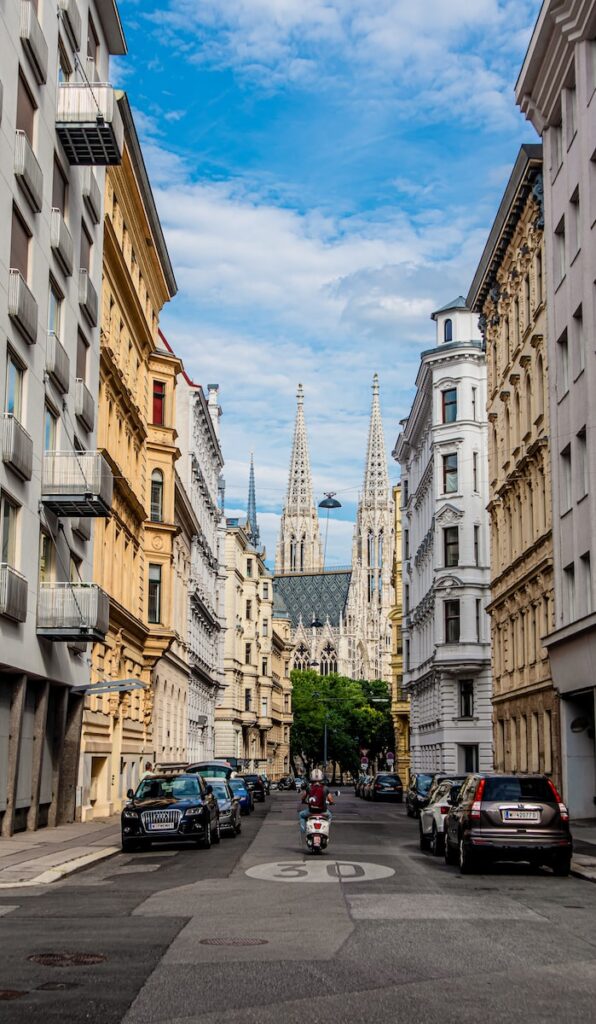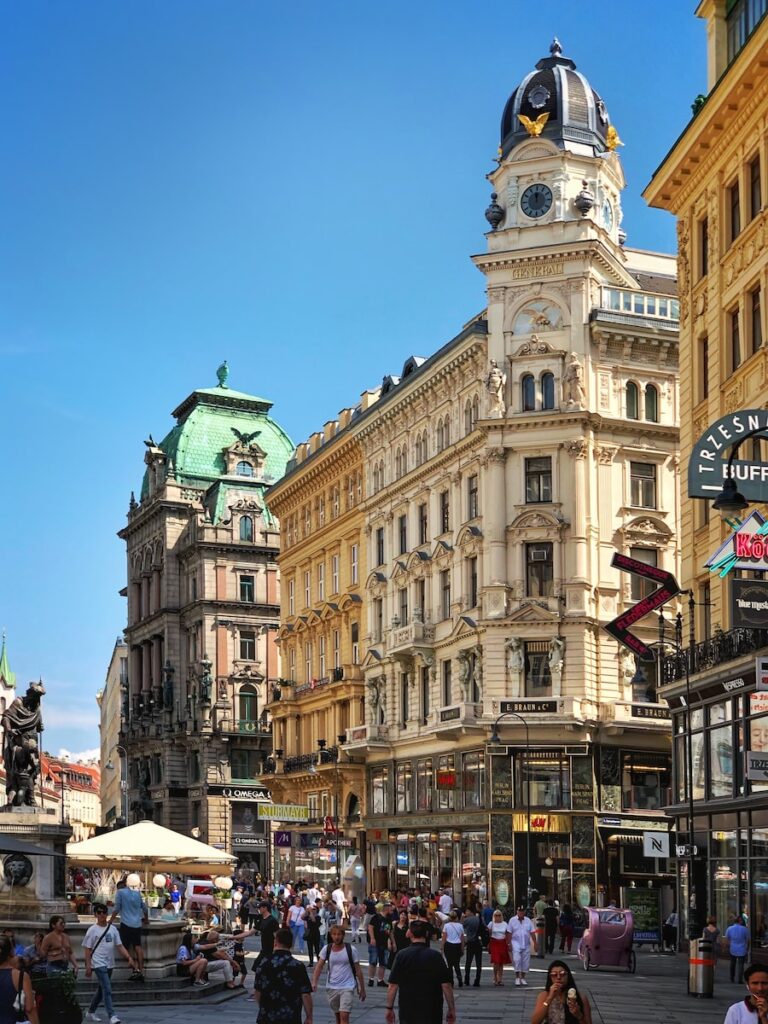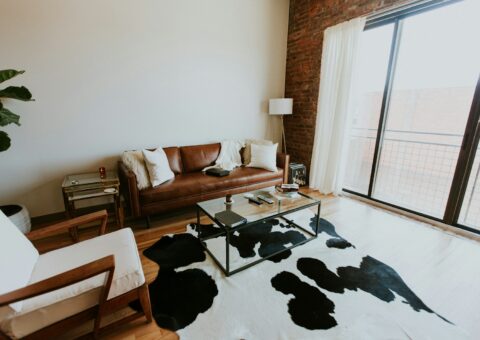12 Things to Know About Living in Vienna
Living in Vienna is any traveler’s dream; a cosmopolitan city on the surface, it offers up all the conveniences of modern living while still being packed full of art, culture, and history. Named the most liveable city in the world in 2022, according to the EIU Global Liveability Index, Vienna has become a melting pot of expats and travelers from all over the world.
However, before you get too excited and book the next flight out of town, there are a few things worth knowing, including where to live, how to find a job and the intricacies of moving to Vienna with your family. Luckily, we’ve done all the research so you can digest, enjoy and look forward to the move. Here’s our take on the most important things to know about living in Vienna.
1. Pros and Cons of Living in Vienna
Pros of living in Vienna:
- Impressive public transport. Buses, metros, and trams all operate punctually in the city, while national trains connect Vienna to Austria’s cities.
- English is widely spoken. Most locals speak English, and finding your way with just basic Austrian German is easy enough.
- Bicycle-friendly city. With plenty of bicycle lanes throughout the city, cycling is an easy and affordable way to get around Vienna.
- Great connections to the rest of Europe. Hidden away in the heart of Europe, several countries will be just one train ride away when you’re living in Vienna, including Slovenia, Slovakia, and the Czech Republic.
- High-quality health care. Healthcare in Austria is considered to be some of the best in Europe, and the majority of care is covered.
- Plenty to see and do. Vienna harbors a world-class arts and culture scene with well-known museums, including the Kunsthistorisches Museum Wien, Belvedere Palace, and Natural History Museum.
- Thriving ex-pat community. Fellow ex-pats from around the world can be found in Vienna; it’s worth joining local groups on social media to find your new circle of friends.
- Low crime rate. Ranked as the fifth most peaceful country in the world, the crime rate as a whole in Austra is low, and serious crime is almost unheard of.
Cons of living in Vienna:
- Accommodation can be difficult to find. Housing in Vienna can be difficult to find, and agent fees are notoriously high. A great way to avoid this is by renting a furnished apartment that includes everything you need in one monthly price.
- Winters can be cold and long. Winter sets in around November and lasts until March in Vienna, with an average temperature of 5°C.
- Austrian German can be difficult to learn. While many locals in Vienna speak English, it helps to learn Austrian German to help broaden your job opportunities and make traveling outside of the city easier. Austrian German is particularly difficult, so it’s worth learning the basics before you move.
- Shops and businesses close on Sundays. Sticking to its traditional roots, the majority of businesses, such as restaurants, bars, and supermarkets, all close on Sundays.
2- Best Neighborhoods in Vienna
Modern Vienna consists of more than 23 districts, and choosing the right one for your wants and needs isn’t always an easy task. Here’s our round-up of the best neighborhoods in Vienna.
Innere Stadt
Considered to be the very heart of Vienna, Innere Stadt makes up the historic Old Town. Packed full of top tourist attractions, including The Hofburg and Rathaus Town Hall, there is never a quiet moment in this part of Vienna. While its streets may be busy, and its rental prices higher than average, living in Vienna doesn’t get much better than this, offering up everything you could imagine from Austrian life right on your doorstep.
Neubau
One of Vienna’s coolest neighborhoods, Neubau, is seen as the city’s cultural and artistic center. Head over to the end of Burggasse, and you’ll find Vienna’s very own Museum Quarter, next to intriguing independent restaurants, cafes, and bars. While its bohemian lifestyle and forward-thinking community mainly attract a younger crowd, you’ll also find families and older residents calling this neighborhood home.
Mariahilf
Sitting in the heart of this western neighborhood in Vienna is Mariahilfer Strasse, a shopping street lined with high-street retailers, restaurants, and hotels. Despite being most well-known for its fantastic shopping opportunities, Mariahilf is also a hub for families. Beyond its busy shopping strip lie quiet residential streets, home to spacious family homes, highly-rated schools, and open green spaces, ideal for anyone moving to Vienna with a family.
Josefstadt
Acting as a bridge between Vienna’s busy city center and leafy green suburbs, Josefstadt offers residents the best of both worlds. A premier neighborhood, accommodation here isn’t cheap, but you’ll find yourself living in a world of opulence; organic supermarkets, specialty wine bars, hot yoga studios, and open boulevards characterize the area. Despite its grand exterior, Josefstadt is also enjoyed by a healthy community of students, thanks to the city’s university.

3- Accommodation Options in Vienna
There’s no point beating around the bush here – living in Vienna as an ex-pat can be extremely frustrating when it comes to finding accommodation. Most short and long-term rentals are only available through one of the city’s (expensive) agents that generally come attached with extortionate fees – these can often be in their thousands.
If you are lucky enough to find an apartment that is dealt with directly through the owner of the property, they will be advertised as provisionsfreie wohnungen, which loosely translates as agent-fee-free apartments. To find these fee-free apartments, the best bet is to hunt around on the internet.
One good option is to use Homelike’s search engine, where you’ll find both short-term apartments and long-term rentals, all of which have absolutely no fee to pay. What’s more, all of the flats come fully furnished, and most include utility bills and the cost of Wi-Fi in the monthly rental fee, so you can rest assured knowing that everything is taken care of. What’s more, if you’re planning on living in Vienna with your four-legged friend, you’ll find listings for pet-friendly apartments too.
4- Meldezettel and Meldepflicht in Vienna
One of the most important things to remember once you’ve moved to Vienna is to organize your Meldepflicht. This is simply the process of registering yourself – and your family – at your new address so that you exist in the eyes of the state. You’ll need to do this within three days of living in Vienna and moving into your new home. Without it, you’ll struggle to do basic tasks like opening a bank account, setting up Wi-Fi in your home, or getting access to health care.
The process of completing Meldepflicht is relatively simple; all you need to do is fill out a Meldezettel, otherwise known as a registration form, and drop the documents off at your local Meldeservicestelle or Registration Service Center. For non-Austrian citizens, you must also include a valid and original copy of your travel document, e.g., your passport. Once the documents have been checked and accepted, you will receive a Bestätigung der Meldung, officially known as a Residence Registration Certificate.
When you move out of your apartment, you’ll need to go through the same process and de-register yourself from the property.
5- Average Cost of Living in Vienna
Vienna is by no means one of the cheapest places to live in Europe, but it’s not one of the most expensive either. Like any other capital city, there are ways to reduce your cost of living – renting an apartment in the outer suburbs, utilizing bicycle paths around the city, and cooking in as much as you can, to name just a few.
Vienna is undoubtedly a city that can be molded to most budgets, from those living on a shoestring to those searching for a life of luxury. To give you a general overview of how much you might spend while you’re living in Vienna as an ex-pat, here are a few average costs according to numbeo and Homelike.
Food and Drink
- Three course meal for two people – €55
- Beer 0.5 liter – €4
- Coffee – €3.50
- Milk 1 liter – €1.20
- Loaf of bread – €1.80
- 12 Eggs – €3.40
- Cheese 1kg – €11
- Chicken fillers 1kg – €10.50
- Apples 1kg – €2.20
- Potato 1kg – €1.60
- Water 1.5 liter – €0.60
Transport
- One way ticket on local transport – €2.40
- Monthly pass – €45
- Taxi 1km – €1.42
- Petrol 1 liter – €1.80
Rent
- Furnished one bedroom apartment in city center – €2,350/month
- Furnished one bedroom apartment outside of city center – €1,630/month
- Furnished two bedroom apartment in city center – €3,320/month
- Furnished two bedroom apartment outside of city center – €2,110/month

6- How to Open Bank Account in Vienna
Opening a bank account is usually high on the agenda for anyone living in Vienna as an ex-pat. Not only will it be an essential part of life in Austria if you’re hoping to find a job in the country, but it can also help when it comes to paying rent and other utility bills in the country. Luckily, opening a bank account isn’t tricky; both foreigners and those with proof of residency can do so in a few simple steps.
Before you do go ahead and open a bank account, it’s worth understanding the different types available in Austria. These don’t differ too much from what you’d expect in other European countries:
- Girokonto. This is what is usually known as a current account and is the most popular bank account type in Austria. With a Girokonto, you’ll receive a debit card so you can access ATMs, and you can attach a savings account.
- Sparbuch. Savings accounts normally come hand in hand with current accounts and give you an easy way to put some money aside for a rainy day.
- Kreditkarte. If you have a good credit rating, you may be able to get approved for a credit card, although this is much harder if you’re a non-resident.
Once you’ve chosen which type of bank account suits your wants and needs, you’ll need to gather a few documents:
- Proof of identity (passport if you’re a foreigner)
- Proof of address (in Vienna or abroad)
- Proof of employment
- Last three payslips (not all banks require this)
How you then apply to open a bank account depends on whether you choose to bank with a traditional high-street bank or opt for an online alternative.
Traditional Banks in Austria
Vienna is home to a whole range of big-name banks, including Bank Austria, CitiBank, Erste Group Bank, Deutsche Bank, and Western Union Bank. As you’d expect with traditional banking, you’ll find branches for most in all big cities around Austria, including Vienna. These can be a great option if you’ve already got an account open with one of these names or if you’re looking for fully-fledged financial services, complete with added extras like overdrafts and credit cards. It’s worth noting that traditional banks tend to charge quarterly maintenance fees, which usually average between €10 and €15/month.
Online Alternatives to Banking
In the past decade, we have seen a surge of online, non-traditional banks. While the idea of not having a physical branch to go into may seem daunting to some, online banks tend to offer very similar services to traditional banks; however, they simply provide their services through the convenience of an app. Big names in mobile banking include N26, Revolut, Bunq, and Raiffeisen Landesbank.
When it comes to living in Vienna, mobile banking can offer up a wealth of pros, including quick set-up times, low or no maintenance fees, and accessible on-the-go banking. However, before you choose the bank for you, make sure to check out the financial service the bank offers, as these tend to be slightly more limited with online banks.
7- Setting Up a Mobile Phone in Vienna
If you’re living in Vienna as an ex-pat, you’ll probably want to get your mobile phone working in the country as soon as possible. The good news is that it’s relatively quick and easy to get your phone up and running. What’s more, Vienna has a well-developed 4G network (in places 5G) and mobile phone signal around the city; you’ll only tend to find problems with coverage as you head out of Vienna into the country’s more mountainous regions.
How to set up your mobile phone depends on where you’re traveling from. If you’re heading to Vienna from a nearby European country with a GSM network, your phone should automatically connect to a local network. However, you’ll want to make sure you understand the charges and tariffs that come along with it.
If connecting to the local network isn’t an option, finding a local pre-paid sim card isn’t difficult. There are three main providers: A1, Magenta Telekom, and Drei, all of which have stores around the city. Generally, the sim itself will cost around €10. When you buy a sim card, you’ll have to register it to your name and bank account. While pre-paid sim tariffs tend to be a little more expensive, they’re a worthwhile option if you’re not planning on living in Vienna for the long term.
However, for those planning on living in Vienna for at least 12 months, it’s worth investing in a mobile phone contract. Generally, these are more affordable as many come with unlimited data, calls, and texts for a fixed monthly fee. Getting your hands on a mobile contract is a little more complex, and you’ll need to take your proof of identity and address and need to have already set up an Austrian bank account.

8- Tips on Finding a Job in Vienna
Working in Vienna is a great way to meet new people, settle into true Austrian life and fund your life while you’re at it. Here are our top tips on finding a job while living in Vienna:
- Make sure you’re eligible. Part of the EU, most citizens of other EU and EEA countries, are free to work and live in Vienna. However, those living outside of these areas may require a visa to work legally in the country. Make sure you check out your individual requirements before you move.
- Consider the type of work. Austria has a highly skilled workforce, with a range of jobs available in most industries. Energy, finance, telecommunications, and real estate are all booming industries in 2022.
- Start learning German. Finding a job in Vienna becomes a lot easier when you have the basics of German under your belt. Without it, you’ll be restricted to English-speaking jobs only, which are hard to come by and in high demand.
- Search online before you move. To ensure a smooth transition to Vienna, it can be helpful to start your hunt before you move. That way, you’ll have a better idea of salary and lifestyle.
- Update your CV. What’s expected on your resume in Vienna could be entirely different from what you’re used to. For example, in Austria, it’s common to include your date of birth, marital status, and even a headshot on your CV.
9- Moving to Vienna with Your Pet
If living in Vienna without your four-legged friend is a big no-no, then you’ve got some work to do. Relocating with your pet to Austria isn’t a difficult task, but there are a lot of things to organize before you make the big move. Here are the requirements your pet must meet before being able to come to Austria:
- Microchipped. All pets moving to Austria must be microchipped, and the authorities will accept no other form of identification.
- Rabies vaccination. All pets need to have an original Rabies Certificate signed by a veterinarian, and it should have been administered a minimum of 21 days ago.
- Recommend vaccines. While other vaccinations are not mandatory, the Austrian authorities highly recommend the following for:
- Cats: Feline Viral Rhinotracheitis, Calicivirus and Panleukopenia (FVRCP).
- Dogs: Distemper, Hepatitis, Leptospirosis, Parainfluenza and Parvovirus (DHLPP) and Bordetella.
- EU Health Certificate. A standard health certificate must be filled out by a veterinarian professional no more than 10 days before the point of entry.
In addition to the above, your pet must be at least seven months old, and the only entry points are Vienna, Linz, Salzburg, Innsbruck, Graz-Thalerhof, and Klagenfurt. If any of the requirements are not met, your pet will be asked to quarantine for a set period of time.
10- Moving to Vienna with Your Family
Moving to Vienna with your family can be a daunting task; after all, there’s more to think about than just accommodation and bank accounts. Whether it’s childcare, schooling, or simply family-friendly activities that you’re worried about, we’re here to give you an insight into life in Vienna as a family.
The quality of schooling in Austria is generally very high, with the country performing above average compared to Europe. Most children in Vienna attend state schools that are funded by the government, but there are a handful of highly-rated private schools, including Danube International School, Vienna European School, and Oakcrest School. Many of the private schools around the city cater to English-speaking students.
Outside of education, Vienna is a fantastic place to bring up young ones. As you head a little out of the city center, you’ll find plenty of green open space and family-friend activities to keep you occupied during the weekends. These include the Natural History Museum, Zoom Children’s Museum, Vienna Zoo, and Prater Park.
11- Childcare in Vienna
If you’re moving to Vienna with little ones, you’ll be glad to hear that there are ample childcare options, including day school, pre-school, and even live-in nannies. All options vary in price, so it really depends on your budget and how many days your children need to be looked after.
Austria operates a universal childcare program that is open to all children of preschool age (5-years old). To access these services, you simply need to register at your nearest Gemeindeamt, otherwise known as the municipal office.
Pre-school and daycare options come in different shapes and sizes:
- State Kindergartens. These can be accessed under the childcare program, and places can be applied for online. They are for children aged from three to six and are usually open between the hours of 7 am and 6 pm.
- Private Kindergartens. Similar to state kindergartens, these cater to children from the ages of three to six, and all will charge different daily, weekly, or monthly rates.
- Betriebskindergarten. Some companies provide childcare for their employees in places called Betriebskindergarten.
International childcare. Around Vienna, you’ll also find international childcare centers, where lessons are taught mainly in English, with a little bit of German thrown in.
12- Learning German in Vienna
Whether you’re living in Vienna for a short time or a long time, it really pays to learn some of the local language. Even if you already have some experience with German itself, Austrian German is subtly different, and understanding the different dialects can be difficult.
There are many different ways to learn German in Vienna, from weekly lessons to casual language exchanges. One of the best ways to do this is to sign up for a 10-week course with one of the city’s language schools. The German Academy Language School, INNES Institute Vienna, and Deutschothek Sprachschule all come highly recommended. Several companies in Vienna also offer their employees German lessons as part of the contract, so it may be worth looking out for this benefit in job advertisements.
Alternatively, if you’re on a budget, there are a number of language exchange groups scattered around the city. These are usually free to attend and work by spending half your time speaking in your native language and half the time speaking in your target language.
Final Thoughts on Living in Vienna
Setting yourself up for a successful life in Vienna can take some time and effort, but it can all be worth it when you’re living in one of the most desirable cities in the world. Boasting a mixture of modern institutions and historic charm, all of the must-do tasks before moving to Vienna are relatively easy to complete – whether it’s setting up a bank account in the country, connecting your phone to the local network, or enrolling your children into school. You can make the move even easier by securing a serviced apartment in Vienna before you fly, so your home is ready and waiting before you even get off the plane.






















